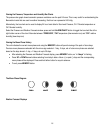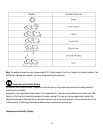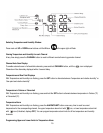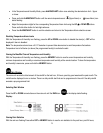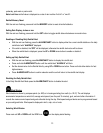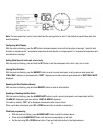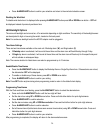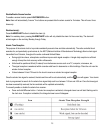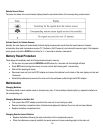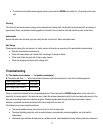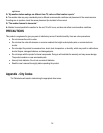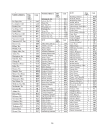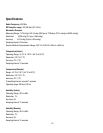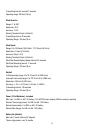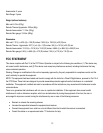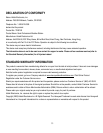
27
• To enforce an immediate remote signals search, press and hold DOWN arrow button for 4-5 seconds on the main
unit.
Cleaning
The main unit and remote sensor casings can be cleaned with a damp cloth. Small parts can be cleaned with a cotton tip or
pipe-cleaner. Never use abrasive cleaning agents and solvents. Do not immerse units with electronic parts under water.
Anemometer
Assure that wind vane and wind cups spin freely and are free from dirt, debris and spider webs.
Rain Gauge
Checking and cleaning the rain sensor in a timely manner will maintain an accuracy of the precipitation measurements.
• Remove the protective screen and lid.
• Clean with soapy water and a damp cloth, removing dirt, leaves or debris
• Clean small holes and parts with Q-tips or pipe-cleaner.
• Clean the swinging mechanism with a damp cloth.
Troubleshooting
Q: “The display shows dashes “---” for weather parameter(s)”
A: The display will show “- - -” when the wireless connection with the remote sensor is lost for the following periods:
Thermo-Hygrometer 15 minutes
Anemometer (Wind Sensor): 15 minutes
Rain Gauge (Rain Sensor) 30 minutes
Check or replace the batteries for the corresponding sensor. Then press and hold DOWN arrow button on the main unit to
search for all remote signals. If this does not work, check the wireless transmission path from the corresponding sensor to the
main unit and change locations to improve reception. Wireless signals pass through solid objects and walls, however,
whenever is possible the sensor should be within line-of-sight with the main unit.
The following may cause reception problems:
• The remote weather sensor and a main unit are too far from each other.
• The signal shielding materials, such as metal surfaces, concrete walls or dense vegetation, are in the path of
transmission.
• Interference from wireless devices such as: cordless phones, radio headsets and baby listening devices or electronic



